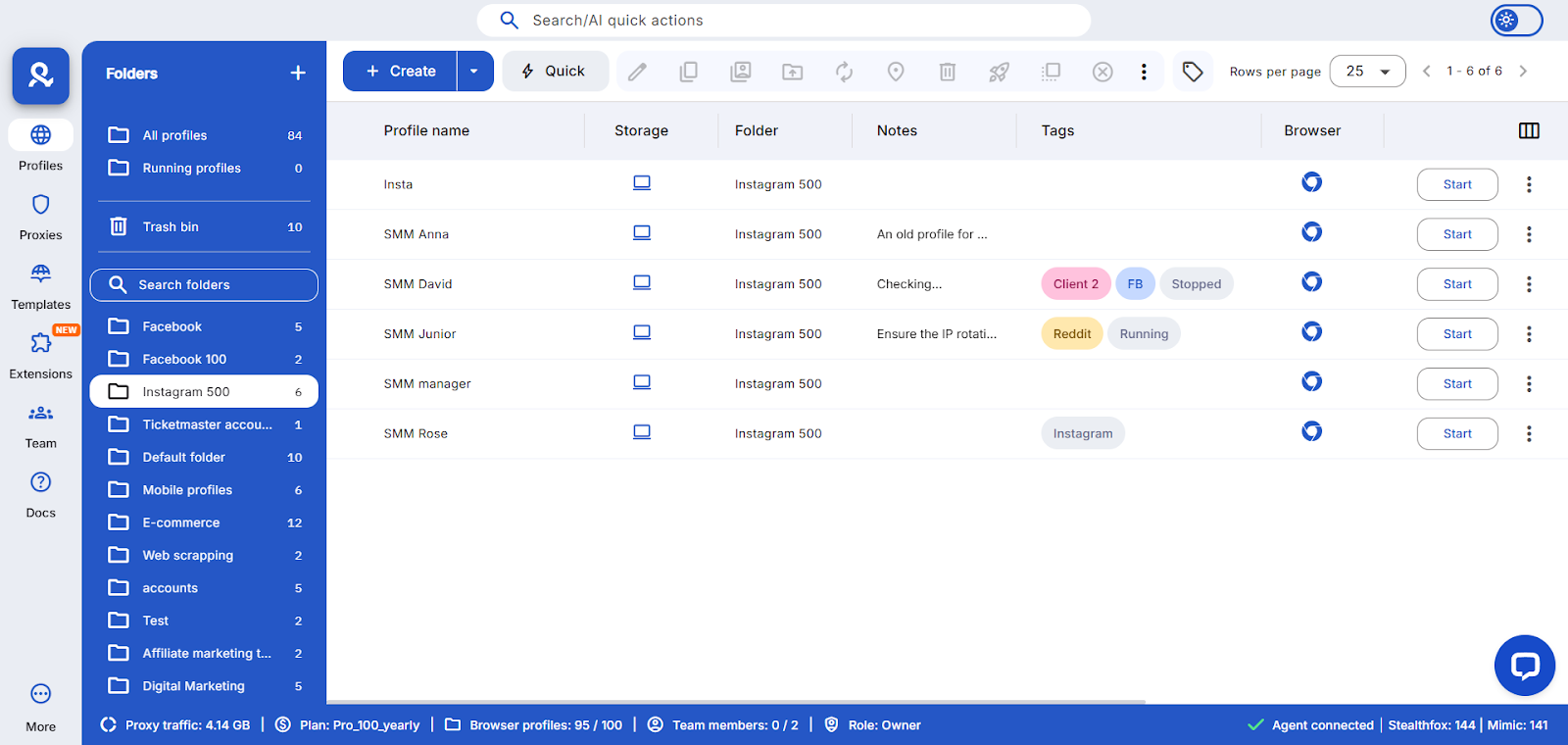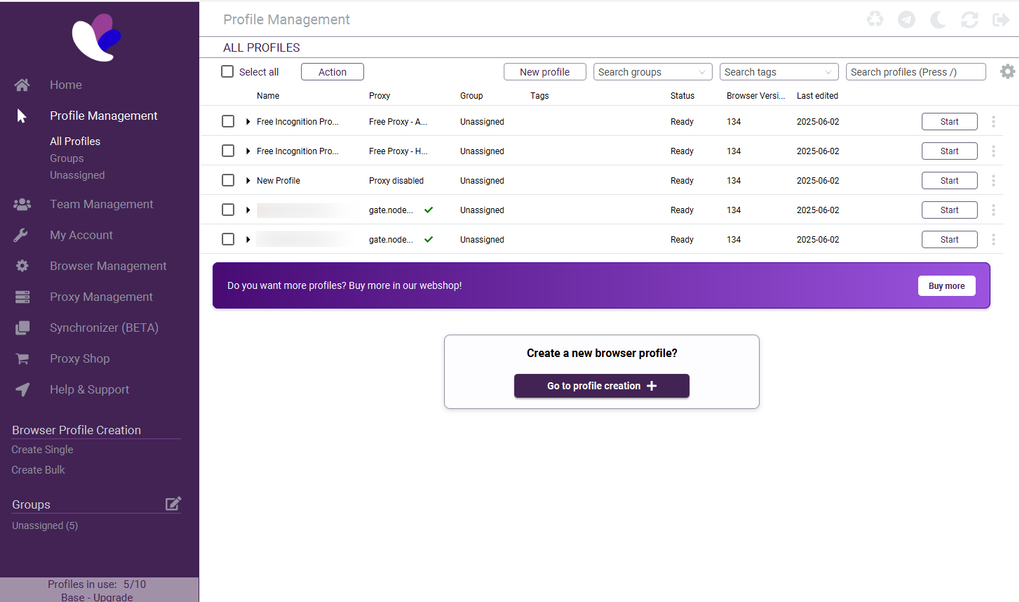
Many digital tasks like market research, e-commerce, and ad checks require using several accounts. If platforms link those accounts, it can cause downtime and lost revenue. Tools that create separate browser environments help by giving each account its own isolated setup.
This review looks at Multilogin and Incogniton one feature at a time. It focuses on what most businesses care about: clear pricing, strong performance, and tools that are easy to manage.
Overview of Comparison: Multilogin vs Incogniton
An antidetect browser is a tool that creates isolated, controlled environments to mask real device fingerprints, enabling safe multi-account operations. There are many solutions on the market, but most of them are basic tools.
So why did we decide to compare these two? Multilogin suits solo users and small teams. It has an easy setup, built‑in proxies, and scalable profile management. Incogniton offers a basic, lighter setup for teams with simple fingerprint needs.
Let’s take a closer look at how Multilogin and Incogniton compare.
Reliability and stability comparison
Reliability and stability matter for any business tool.
Let’s compare Multilogin and Incogniton to see which one stays consistent and avoids disruptions.
Multilogin

- Industry experience: Founded in 2015 in Estonia, the platform has nearly ten years of development in the antidetect browser space;
- Browser types: Multilogin offers Mimic (Chromium) and Stealthfox (Firefox) for stable anti-fingerprinting;
- OS support: Fully supports Windows, macOS, and Linux
- Advanced fingerprinting: Uses 55+ system parameters to create unique browser profiles that match real setups
- Proven reliability: The engine is tested daily on 50+ platforms to ensure stable, long-term performance
- Mobile emulation: Includes Android‑based mobile profile emulation to simulate real mobile devices for mobile‑first platforms.
Incogniton

- Standard fingerprinting: It offers basic antidetect features but does not match Multilogin’s daily testing.
- Limited emulation: Mobile profile options are more limited, which can affect demanding workflows.
- Higher risk: The lighter testing and feature gaps make it less reliable for businesses that face strict platform checks
Verdict
Multilogin has ten years of work and constant tests behind it. It is a reliable option for small teams and beginners. Many businesses also choose it when they need steady and stable performance.
Built-in tools comparison
Multilogin is more than a standalone browser. Every plan comes with the browser and built-in residential proxies. These tools help maintain performance and prevent bans, detection, or technical problems.
Multilogin
- Built‑in residential proxies: Included in every plan for predictable, stable, and cost‑efficient operations;
Mobile browser emulation: Android-based mobile profiles for platforms that prioritize mobile behavior; - All‑in‑one proxy management: Allows to manage, apply, and monitor proxies without relying on external tools;
- Pre‑made cookies: Ready-to-use cookies that help warm up accounts and reduce detection risks;
- Automation Support: Multilogin supports Puppeteer, Selenium, Postman, Playwright, and Quick AI Actions.
Incogniton
- Unpredictable cost: Requires DIY proxy sourcing, resulting in an unpredictable final cost due to the mandatory, separate purchase of proxies;
- Fragmented workflow: Lacks all-in-one proxy Management and requires manual configuration, adding friction and technical overhead;
- Limited automation: Automation support is limited to higher-tier plans, restricting scalability for growing businesses.
Verdict
Multilogin’s all-in-one model offers predictable costs and a smooth workflow, which helps businesses scale. Incogniton adds extra steps and can lead to variable costs.
Customer success and support quality
Good support, strong security, and easy team collaboration are key to running your business. This section compares Multilogin and Incogniton to show how each handles these important aspects.
Multilogin
- 24/7 support: guarantees 24/7 expert support in five languages;
- Enterprise security: provides 2FA for bulletproof security and flexible storage (local or secure cloud) with strict access controls;
- Team collaboration: offers easy collaboration with advanced team access and role-based permissions.
Incogniton
- Limited support: offers limited support (primarily email-based during office hours), which can lead to extended downtime and increased operational risk;
- Basic security: lacks the comprehensive 2FA and flexible storage options that Multilogin provides for enterprise-grade security;
- Limited collaboration: it has team features but does not offer unlimited team access. It also lacks advanced security controls needed for large, secure operations.
Verdict
Multilogin offers 24/7 support, strong security, and full team features. This gives businesses peace of mind and ensures smooth, continuous operations.
Pricing comparison
Predictable costs are crucial for businesses managing multiple accounts. This section compares how Multilogin and Incogniton deliver value and scalability.
Multilogin
- Transparent, all-inclusive pricing with residential proxies already included for free in every plan;
- Flexible entry with a €1.99 3-day trial including 5 profiles and proxy traffic;
- Scalable plans from 10 to 10,000+ profiles with unlimited team seats and automation.
Incogniton
- No trial option;
- Paid plans: Entrepreneur $29.99/month (50 profiles), Professional $79.99/month (150 profiles), Multinational $149.99/month (500 profiles);
- Proxy costs are not included, requiring separate purchases, which makes monthly expenses unpredictable.
Verdict
Multilogin offers clear pricing for beginners, small teams, and large operations. Incogniton’s extra costs and tier limits make scaling harder and less predictable.
Conclusion
For businesses that value reliability, scalability, and ease of use, the choice is clear. Multilogin offers a complete platform with built-in proxies, mobile emulation, pre-farmed cookies, 24/7 support, and fixed pricing. It works well for beginners, small teams, and large companies. Incogniton provides basic anti-detect features and a lighter setup. But separate proxy costs, limited automation, and tiered features make it harder to scale and less predictable.

